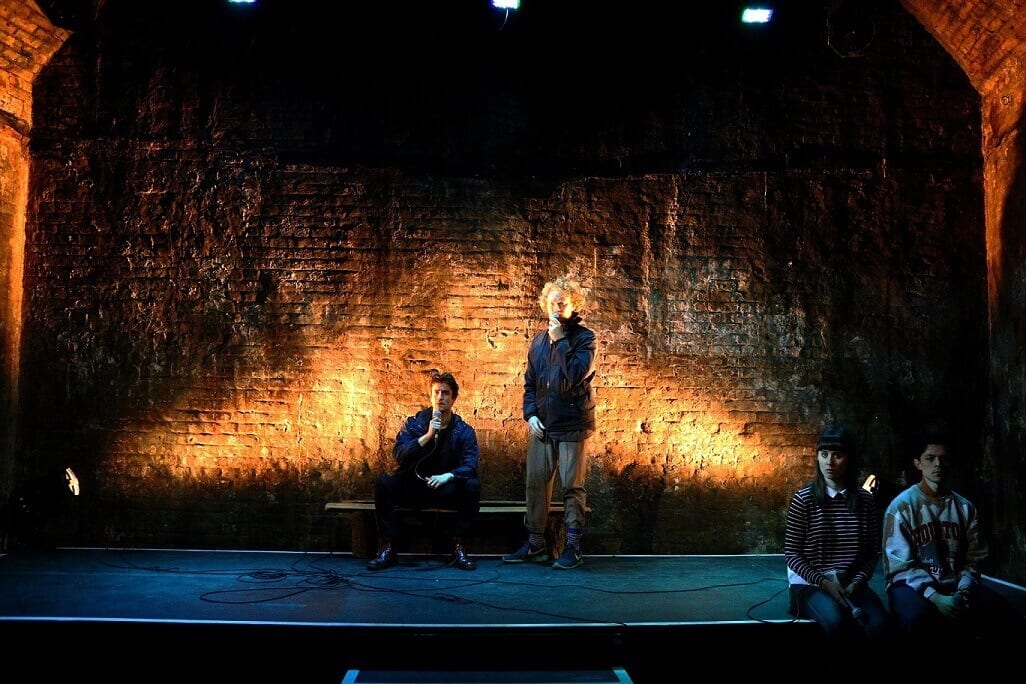Down where the faint smell of wet cement meets neatly choreographed graffiti and trains thunder along the map of the underground overhead. Down further still, following a snaking queue into a dark hole and then peeking around its head to see four microphones littering a tiny stage. Ah- here we are, the fifth of six sold-out performances, This Must Be The Place. As a twin plot turns, a foggy digital-age paranoia gradually culminates in this grey cave of a room. What is the difference between talking to a person face-to-face rather than through a phone or a keyboard? To what extent should we mistrust new social technologies? How far away or close are we now in comparison to the ‘good old days’? These are the sort of new age questions which linger.
Waiting for the opening line, I watch one of the actors pottering about on a mobile phone and wearing a sort of interrogative expression. One of the narrative strands is a dialogue driven by a string of texts from a dodgy decorator picking up two young men (when I write ‘texts’ I’m referring to a series of SMS messages sent between mobile phones, although -tellingly- that hardly needs clarifying these days.) Tate (Feliks Mathur) is running away from the prospect of becoming a father and Matty (Hamish Rush) is running toward new opportunity in a new city. But the tension here is actually dictated by this bodiless decorator-cum-‘scrapper’ who is only manifested in text messages through Matty’s phone. Turns out he expects money and equipment; what else does he expect?
The second narrative follows Adam’s infolding chain-of-thought and volatile relationship after deciding to throw his phone into a river. Noticing his absence from the wireless social network, Adam’s girlfriend becomes worried. The mobile phone is identified as a symbol and instrument of the relentless connectedness of this era. This connectedness / disconnectedness or communication / miscommunication is at the crux of this play’s academic inclinations. On the one hand, the two plot lines are connected in that they’re interwoven in time and space and often use the same actors in the same dress. On the other, they’re disconnected in that they occupy totally different worlds and follow different characters: one makes extensive use of soliloquy and follows an inner monologue across many locations; the other is a static ‘fly-on-the-wall’, real-time account of two young men in conversation. They’re clearly disparate things stuck together, like two stories on a news feed.
To be absolutely honest these cleverness-es didn’t occur to me immediately. In fact, the more self-consciously intellectual moments were the more jarring. For instance, when Matty, who’s heading into an objectively fishy job as a decorator’s assistant in faraway London, unbefittingly likens his feeling of alienation in Manchester to a ‘cancerous cell in an organ.’ Bar that one sentence, his is a more casual, if disjointed, vocabulary.
That is a blip amongst clear and convincing characterisations. Feliks Mathur and Hamish Rush excel in the ‘waiting for a van’ storyline, capably demonstrating a backwards friendship: despite Matty’s plan quickly unravelling as naïve – or even self-destructive – he continues to be the authority in conversation. This is because the more holes Tate finds in the scheme without abandoning it, the more it becomes obvious that Matty is unconditionally the leader. It’s a realistic and suitably complex balance of power. Matty sits and fidgets awkwardly but is the conversation and narrative’s anchor. ‘1-0’ and ‘2-0’ he says, counting his victories. Feliks’s outward sternness and assertiveness is undermined by his gravitation toward the deeply unsettled and short-sighted Hamish, pacing around him like a totem. It’s an honest relationship that’s brilliantly conceived and marvellously executed.
There’s a mistrust of the mobile phone here (Adam likens losing his to ‘the loss of a limb’) but the show certainly owes it as much as it chastises it. For one, it allows a character who never appears onstage to deliver direct dialogue (in SMS form) which surely benefits his darkly persona. And the ‘phone in the river’ plotline’s conflict is energized by wireless social media, of the lack thereof. Despite This Must Be The Place being admirable for its post-post-modern ambition, it’ll be remembered most deeply for that relationship between two friends which, in essence, is timeless. A train drums the audience into rapturous applause and sparks a reminder of the infinitely reaching arms of the tube map above, trains zipping like electric impulses along black wires – lovers talking across 100 miles on the phone – transnational subcultures emerging in virtual geographical spaces, in online chatboxes beside livestreams of football matches. What seems obvious to us and this play is that the phone is only symptomatic of a general system of commutation and movement which is ever-accelerating, entangling as it connects people and slanting the nature of human relationships.

